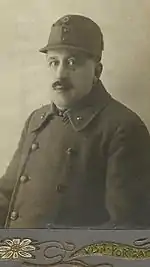Alexander Just
Alexander Friedrich Just (12 April 1874, in Bremen – 30 May 1937, in Budapest) was an Austro-Hungarian[1] chemist and inventor.[2] Later, in Hungary he used the name Just Sándor Frigyes. In 1904 with Austro-Hungarian Franjo Hanaman he was the first to develop and patent an incandescent light bulb with a tungsten filament, made by extruding a paste of tungsten powder and a carbonaceous binder to produce a fine thread, then removing the carbon by heating in an atmosphere of hydrogen and water vapors.[3] Just and Hanaman received a Hungarian patent in 1904, and later US Patent 1,018,502.[1] In 1905, Just and Hanaman patented a process for producing tungsten filaments by plating carbon filaments with tungsten, then removing the carbon by heating.[4] These early tungsten lamps were more efficient than a carbon filament lamp, because they could operate at a high temperature, due to the high melting point of tungsten. The tungsten was, however, so brittle that these lamps were of limited practical use.[5] It was supplanted by the drawn tungsten filament lamp, developed in 1910 by William David Coolidge.



References
- US patent 1018502, Just, Alexander & Hanaman, Franz, "INCANDESCENT BODIEs FOR ELECTRIC LAMPS", issued 1912-02-27
- "Archived copy" (PDF). Archived from the original (PDF) on 2013-11-11. Retrieved 2012-10-23.CS1 maint: archived copy as title (link)
- Coolidge, W. D. (1912). "Metallic Tungsten and Some of its Applications". Transactions of the American Institute of Electrical Engineers. XXXI (1): 1220. doi:10.1109/T-AIEE.1912.4768477. ISSN 0096-3860. S2CID 51652033.
- Hirst, H. "Recent progress in tungsten metallic filament lamps," The Electrical Journal, Volume LXI, May 22, 1908, pages 215-216. Retrieved December 14, 2011
- Day, Lance and McNeil, Ian "Biographical dictionary of the history of technology," Routledge, 1996. Cited edition is Taylor & Francis eBook, 2005, page 290. ISBN 978-0-203-20131-2. Retrieved December 14, 2011.
External links
- NY-Times 16 April 1916 about Just (pdf)
- "Text of Patent 34541" (PDF) (in Hungarian). 13 December 1904. Retrieved 2012-10-23.